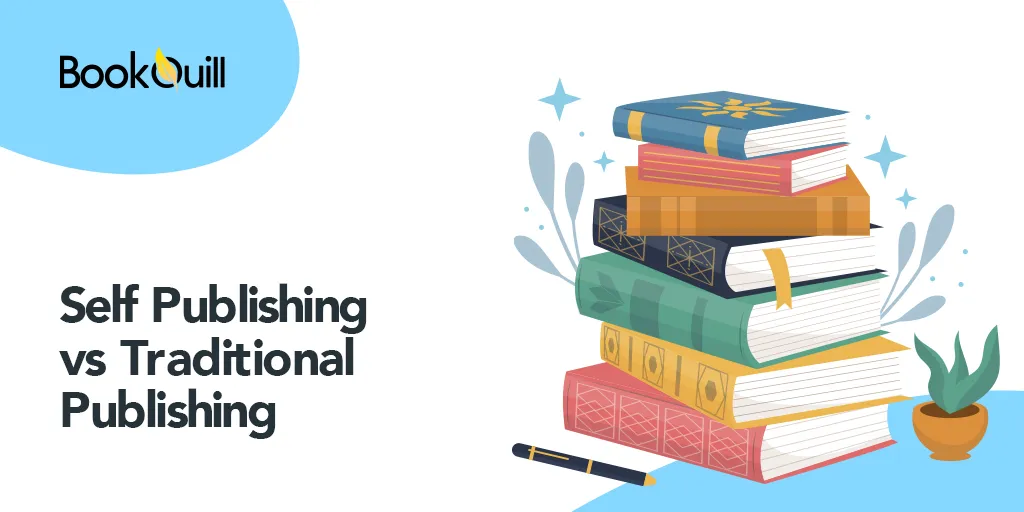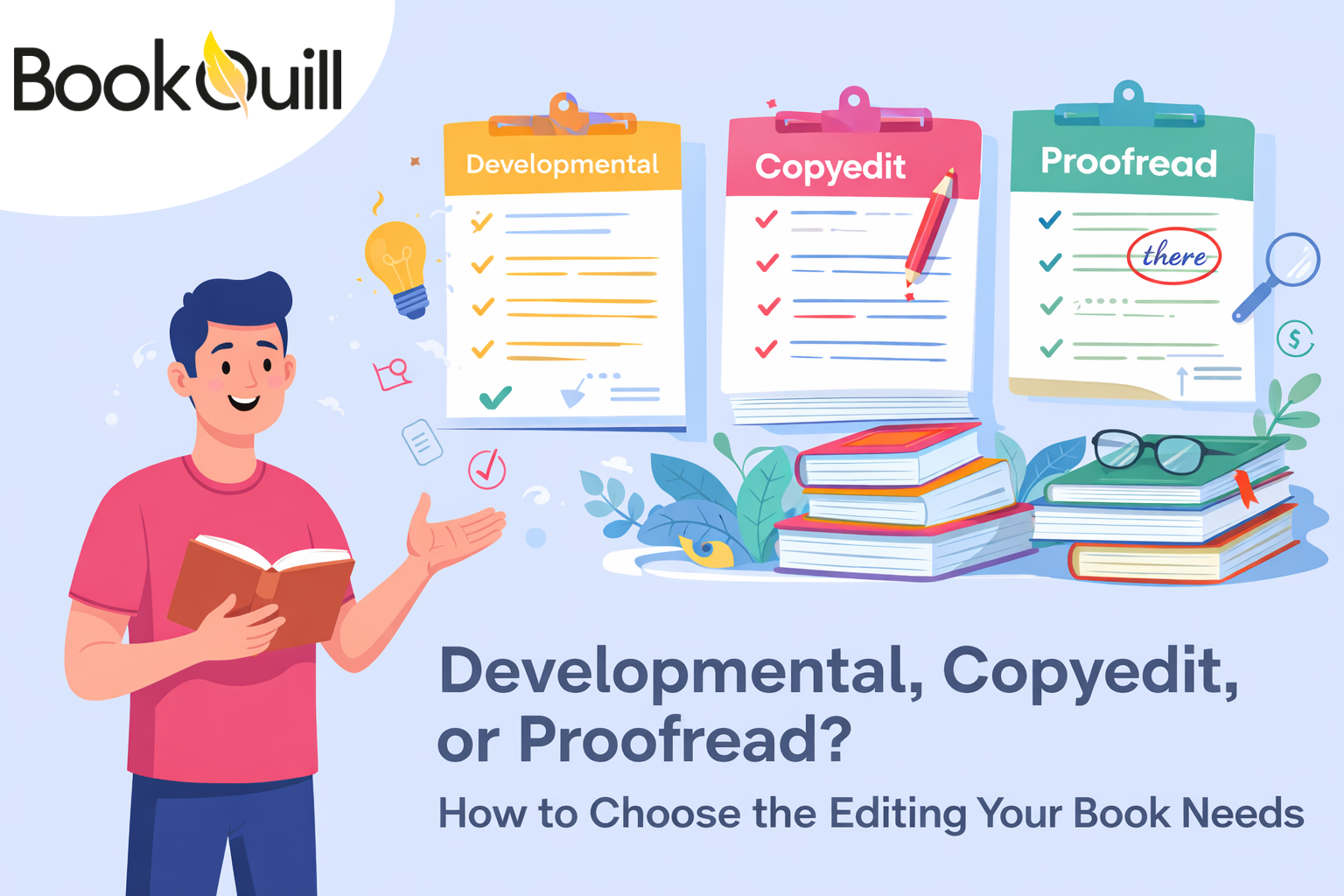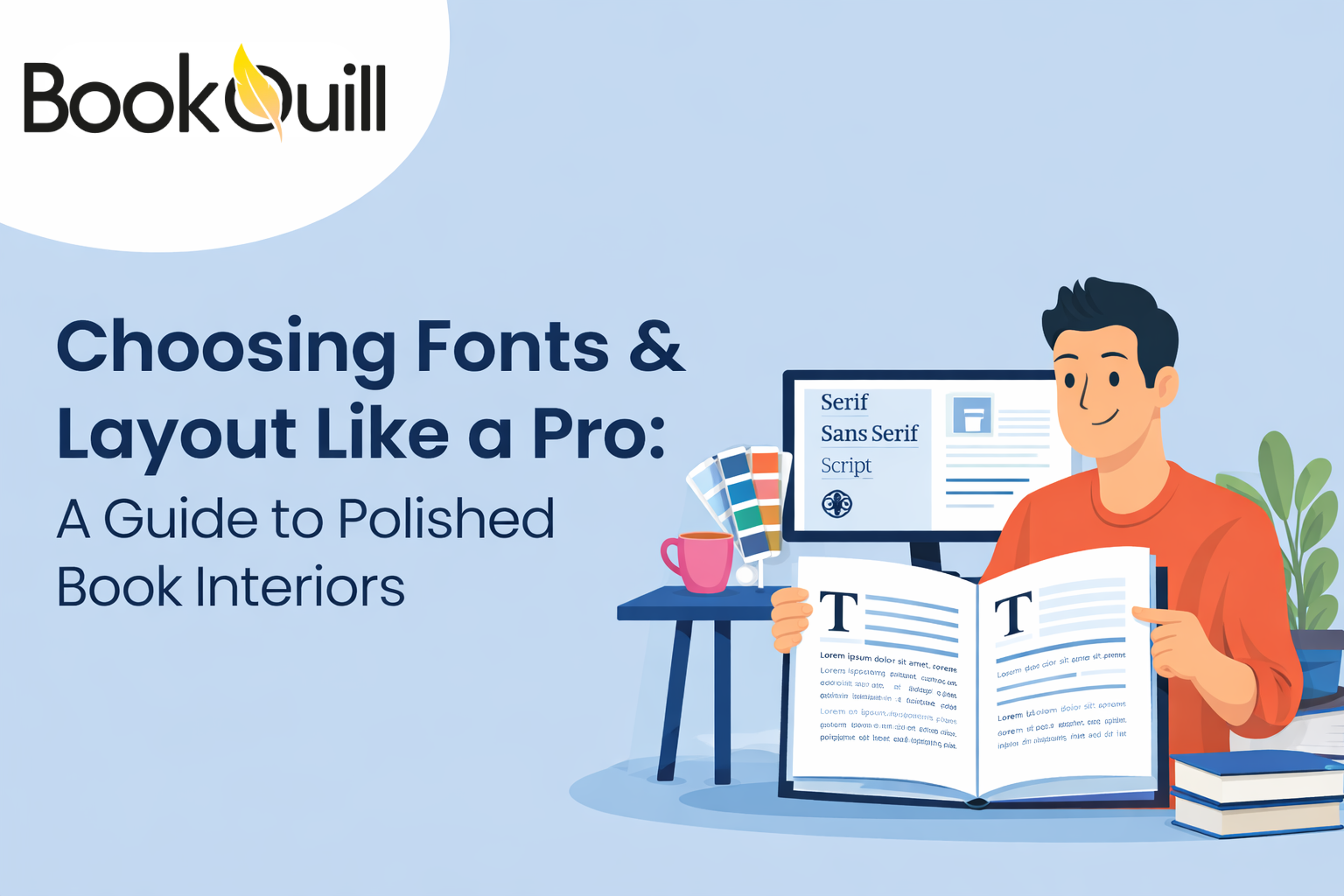Table of Contents
Explore Blogs
Trending on Ebook
Self-Publishing vs Traditional in 2025 (Which is Better?)

Is it better to self publish or get a publisher? What is the difference between self publishing and traditional publishing? These questions often stump up-and-coming writers.
Should they opt for the tried-and-true path of traditional publishing or take matters into their own hands and give self-publishing a chance? The answer to this question is complex.
There are many factors at play when it comes to publishing a book and the choice is highly subjective. While traditional publishing has no upfront investment, self-publishing gives authors better creative control over their work.
In this article, we explore the advantages and disadvantages of both publishing options to help aspiring authors make an informed decision. Let’s get into it!
Self-publishing vs Traditional Publishing: Quick Comparison
| Self Publishing | Traditional Publishing | |
|---|---|---|
| Cost | $2,820 and $4,800* | Free |
| Distribution | Online | Online and Brick & Mortar |
| Royalties | Up to 35%-70% | 5-18% |
| Publishing rights | Yes | No |
| Creative Control | Yes | No |
*According to Reedsy’s 2023-24 data.
Is Self Publishing Worth It?
In self-publishing, writers independently publish and distribute their works, instead of turning to traditional publishing houses. With the rise of online platforms, self-publishing has become more popular in recent years.
Writers can now easily produce and release their work through platforms like Amazon Kindle Direct Publishing, Draft2Digtal, and others, reaching a global audience without the need for traditional publishers.
This democratization of the publishing process has allowed authors to gain creative control, receive higher royalties, and publish content that might not fit the market trends of the time.
With the rise of social media, self-published authors can directly connect with their readership, enhancing the visibility and success of their work. For new authors, especially those struggling to secure a traditional publishing deal, self-publishing is a great option.
Pros and Cons of Self Publishing
Pros:
Creative Control and Freedom
In traditional publishing, authors submit their manuscripts to literary agents or publishers who then make decisions about the book’s content, cover design, marketing strategy, and even potential revisions. So, authors often don’t have a lot of control over the book’s outlook or content once they sign a deal with a publishing house.
One of the biggest advantages of self-publishing is that authors get complete creative control over their work. From cover design to marketing strategies, authors make all the decisions. This allows them to maintain their artistic vision.
Speed to Market
Traditional publishing involves a lengthy process of securing a literary agent, submitting manuscripts, and navigating the editorial and printing timelines. Self-publishing, on the other hand, is quick. It allows authors to bring their books to market much sooner than traditional publishing. This is particularly helpful for works that are trendy or have time-sensitive content.
Higher Royalties
After their work is published, authors typically receive a percentage of the book’s sales as royalties. Traditional publishers offer lower royalty percentages than what authors would get if they decided to self publish. But there is reason for that.
Once traditional publishers decide to work with a manuscript they cover book production costs, including editing, cover design, printing, and distribution. As a result, authors receive a smaller share of the revenue to compensate for these expenses. On average, traditional publishing royalties can range from 5% to 15% of the book’s price.
On the other hand, self-publishing platforms like Amazon Kindle Direct Publishing allow authors to retain a higher percentage of their book sales. Depending on the platform and pricing strategy, authors can earn self-publishing royalties of up to 70%.
Accessibility
Self-publishing provides a platform for unconventional ideas, niche genres, and marginalized voices that might struggle to find representation in traditional publishing. It democratizes the literary world, giving someone who isn’t a famous personality or hasn’t previously published any work the opportunity to publish a book.
Cons
Marketing and Visibility
While self-publishing offers creative control, it also places the burden of marketing solely on the author’s shoulders. To successfully navigate the competitive book market, authors need a fool-proof marketing strategy, involving social media, book bloggers, and other promotional efforts.
Quality Concerns
Without the in-depth editorial processes of traditional publishing, self-published books may face concerns in terms of content quality. Poorly edited or formatted books can harm an author’s reputation and affect reader satisfaction.
Financial Investment
The upfront cost of self-publishing can be a problem for up-and-coming authors. Unlike traditional publishing where the publishing house covers costs like editing, cover design, and distribution, self-published authors are responsible for all these expenses.
Moreover, authors also need to invest in marketing and promotional efforts to ensure their book reaches a wider audience. While these expenses contribute to the success of the book, they can strain the budget of new authors.
|
Is Self Publishing Profitable? Despite the odds, some self-published books have become critical and commercial successes, paving the way for other self-published works. Here are some hugely successful self-published titles:
|
Is Traditional Publishing Worth It?
In traditional publishing, authors submit their manuscripts to literary agents or publishing houses. If accepted, the publishing house handles editing, design, printing, and distribution of the book. This has been the dominant publishing model in the industry for years.
Traditional publishing has been affected by technological advancements and changes in consumer behavior in recent times. The rise of digital platforms, e-books, and online retail has altered distribution methods, impacting the traditional bookstore model.
With the advent of self-publishing as a viable alternative, traditional publishers are adapting, and exploring digital formats to stay relevant in the modern publishing landscape.
Pros and Cons of Traditional Publishing
Pros
Editorial Support
The biggest advantage of traditional publishing is that it offers authors access to professional editors. These editors provide comprehensive feedback, correct grammatical errors, and help refine the manuscript. This editing and proofreading stage ensures that your book meets industry standards and is polished to be its best possible version.
Credibility and Cost
Books published by traditional publishers receive a certain level of validation from readers, literary communities, and critics. This is because such books undergo a highly selective process and benefit from professional editing. This can positively influence the reviews you receive, awards consideration, and your overall standing within the literary world.
One of the most frequently asked questions by authors is, “How much does traditional publishing cost?” Well, traditional publishing typically has no upfront cost for authors. The publishing house covers the production and distribution of the book. In fact, most authors receive a signing bonus along with a royalty share.
Wider Distribution
Traditional publishers have well-established distribution channels so books reach a larger audience. They are connected with major book retailers, both physical and online, making it easier for books to be stocked in brick-and-mortar stores, libraries, and other outlets. This widespread distribution increases the visibility of the book, making it more accessible to potential readers.
Cons
Loss of Control
Authors in traditional publishing have to give up control of various aspects of their work, including cover design, title, and sometimes even content to meet the market trends and make the book a commercial success. As a result, writers might find their original creative vision compromised to fit the publisher’s marketing strategy.
Longer Timelines
The traditional publishing process is known to be time-consuming. From the point you submit your manuscript submission to the book release, the publishing house can take as much time as they need and there is nothing the author can do to hurry the process. This can be a huge disadvantage for books that are time-sensitive or have trendy content as it may no longer be relevant at the time of being published.
Lower Royalties
Traditional publishers offer lower royalty rates to writers as compared to self-publishing. While the publishing house handles upfront expenses by investing in editing, marketing, and distribution, authors receive a smaller percentage of the book’s sales revenue.
Self Publishing vs Traditional Publishing: Which Is Better?
How should get your book published? It depends on your individual goals, preferences, and the specific nature of the book. Here are a few considerations you should make before committing to a publishing model for your book:
Consider Your Distribution Goals
When deciding whether to choose traditional or self-publishing, distribution goals play an important role. Traditional publishers have established relationships with distributors, enhancing the likelihood of your book being featured in physical stores and libraries. If you aspire to have widespread availability in bookstores, traditional publishing may align with your distribution goals.
On the other hand, self-publishing is well-suited for authors looking for a strong online presence. Platforms like Amazon Kindle offer self-published authors a global reach for e-books. These platforms also offer print-on-demand services to those looking to offer physical copies without the large upfront print charges.
Consider the Target Audience and Market
Understanding your target audience and target market is important in deciding between traditional and self-publishing. Traditional publishers have expertise in identifying and reaching specific demographics. They tailor marketing strategies to maximize a book’s appeal within a particular genre to achieve commercial success. If commercial success is your goal, traditional publishing might be the better option for you.
With social media and digital marketing in the picture, self-published authors work to tailor their promotional strategy to their audience. However, it is a time and effort-consuming process. You can opt for a hybrid publishing model by outsourcing the marketing of your book if you lack the expertise to do it yourself.
Do You Have an Entrepreneurial Mindset?
Self-published authors must have an entrepreneurial mindset as they actively need to engage in marketing, branding, and online presence building. On the other hand, traditional publishing handles all these aspects for them.
Successful self-publishing requires continuous self-promotion and business development efforts to ensure visibility and sales in a competitive market. You need to be up for the challenge if you want to take the self-publishing route.
Why Self Publishing is Better?
Self-publishing offers authors unparalleled control over their work, allowing them to oversee every aspect from editing to distribution. This autonomy enables writers to maintain their creative vision without external modifications mandated by traditional publishers. Additionally, self-publishing empowers authors with complete ownership of their rights and royalties, which can often result in higher earnings compared to traditional publishing routes. The ability to reach a global audience through digital platforms enables self-published authors to engage directly with readers and build a loyal following, creating opportunities for dynamic interaction and instantaneous feedback.
Conclusion
Choosing between self-publishing and traditional publishing depends on the book goals and author’s preferences. Self-publishing offers creative control, faster release, and higher royalties but it requires proactive marketing and has a higher upfront cost.
On the other hand, traditional publishing provides credibility, editorial support, and wider distribution but requires sacrificing some creative control and dealing with longer timelines. Ultimately, there’s no one-size-fits-all answer.
The success of your book depends on understanding the pros and cons of each publishing option and selecting the one that best meets your goals and vision for book.
Frequently Asked Questions
Is It Better to Self-Publish or Traditional Publish?
The best publishing model for your book depends on your book goals. If you prioritize recognition and want lower upfront costs, traditional publishing may be the right choice. On the other hand, if you seek a higher share of royalties and want more creative control, self-publishing is the better option.
What Makes More Money Self-Publishing or Publishing?
Self publishing royalties are much higher than traditional publishing royalties. You’ll earn more in royalties with self publishing if your book does well. However, self publishing has a higher upfront cost whereas traditional publishing is free.
Is It Smarter to Self-Publish?
For many authors, self-publishing is a smarter choice. Traditional publishing deals can be difficult to secure and offer a lower royalty share, whereas self-publishing provides more creative control over your work and a better royalty rate.
Do You Need a Publisher to Sell a Book?
You do not need a publisher to sell a book. If you are unable to secure a traditional publishing deal, you can explore the self-publishing route.




